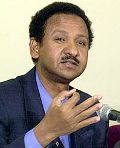Sudan sets up committee to study UN resolution
KHARTOUM, Mar 31, 2005 (Sudan Tribune) — Sudan has started examining the UN Security Council resolution 1591 on Sudan adopted early this morning. The government set up a committee which includes a number of competent organizations linked to the resolution, the official Sudan News Agency reported.
 The Security Council passed a resolution on Tuesday March 30, 2005, imposing an asset freeze and travel ban on people who defy peace efforts in Sudan’s Darfur region, and limiting the flow of weapons into the conflict-wracked area. Also, the resolution expanded a previous arms embargo to include the Sudanese government.
The Security Council passed a resolution on Tuesday March 30, 2005, imposing an asset freeze and travel ban on people who defy peace efforts in Sudan’s Darfur region, and limiting the flow of weapons into the conflict-wracked area. Also, the resolution expanded a previous arms embargo to include the Sudanese government.
Sudanese minister of Foreign Affairs Mustafa Osman Ismail indicated the committee included the foreign, defence, interior, justice and humanitarian affairs ministries, and it would submit its recommendations to the leadership as a preparatory step to put forward its proposal on how to deal with the UN Security Council resolution.
The minister further said the government had made intensive efforts to amend the first draft of the resolution, which initially called for sanctions on the government but was later amended and imposed sanctions on individuals who commit atrocities or undermine peace efforts in Darfur.
He said the resolution had some positive factors as it was directed to those who were violating the cease-fire in Darfur. At the same time, the resolution had an impact on foreign countries whose interference was undermining the peace process in Sudan in general and in Darfur in particular, he added.
Ismail pointed out that the negative points of the resolution included undermining the capacity of the governmental armed forces, and this made it difficult for them to ensure the protection of civilians, as well as confronting rebels and militias, at a time when the UN Security Council resolutions called for safeguarding the country’s peace and fighting outlaws.
The minister asked who would then be responsible for the protection of civilians should the armed forces be undermined.
He said the resolution would have a negative impact on the implementation of the peace agreement in the south as well as the security situation in Darfur. He further said it would also affect the resumption of the peace talks in Abuja and the rebels would receive the wrong message with the resolution and would have to wait.
Ismail pointed out that the government would work towards implementing the resolution even though it was unjust.
